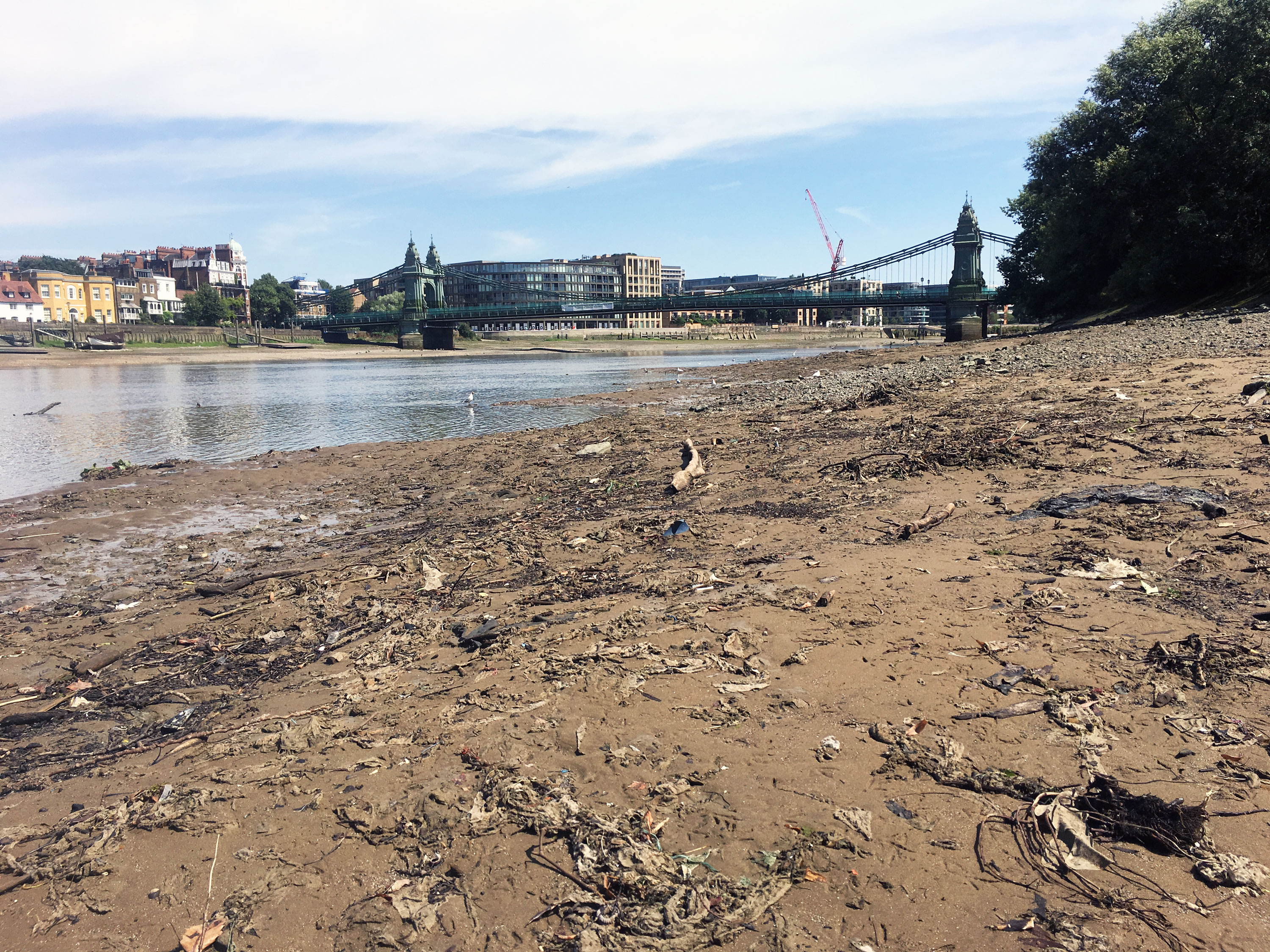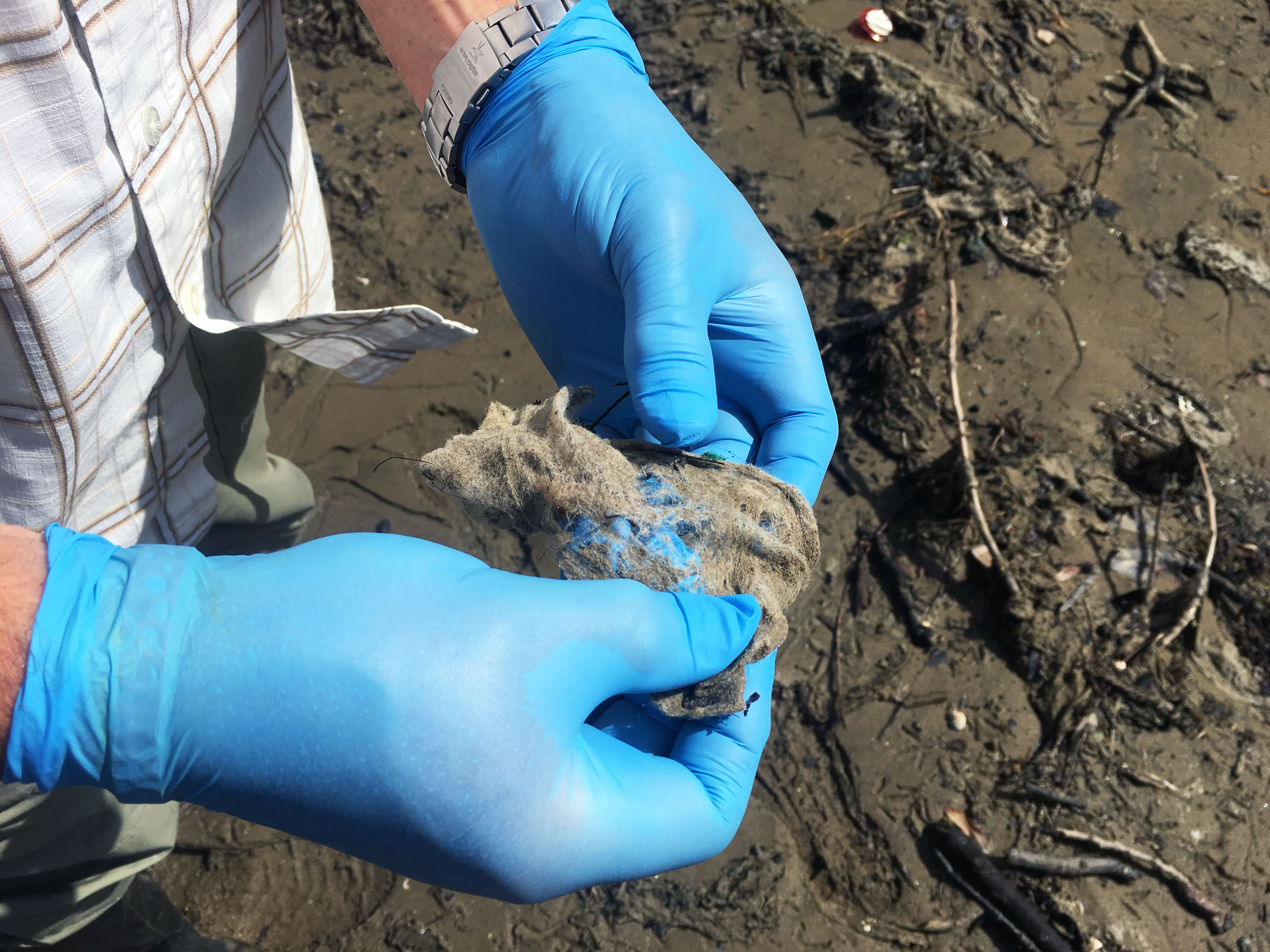If only they knew what they were looking at, I think as I step past the couple enjoying some shady river views on the steps leading down to the Thames by Hammersmith Bridge in west London. Because that bank in front of us isn’t sand and twigs – it’s a mound of dirty old wet wipes that were flushed down London’s toilets.
The dirty rags may look a bit like sandbanks from a distance, but there’s nothing natural about them. Wet wipes have many uses – removing makeup, sanitising hands, scrubbing toilets, wiping your butt – but these tools designed to make life easier and cleaner are a key ingredient in the so-called ‘fatbergs’ that form in London’s sewers. And when these overflow, many of them end up in the river.
Videos by VICE
“The reef has gained a metre in height since September. We removed 23,000 wipes in April but it just keeps coming back,” says Kirsten Downer, communications and campaigns officer at the Thames21 environmental charity, who has joined me by the river.

Standing on top of one of the reefs, I crouch down to get a closer look. The grey wipes are twisted in with twigs, sand and sanitary products, which means more of them catch and bind together, causing the reef to build. Wearing gloves, I pick up one of the wipes, and it’s like pulling a worm out of the ground: the rag stretches to more than double its size, and you think it’s going to break but it doesn’t. It dangles from my hand, wet and sandy, and I drop it, suddenly disgusted by what I’m holding.
The wipe remains intact when I pull it for the same reason that it doesn’t break down: it contains plastic. “Polyester and other polymers is quite common in wipes, as it gives them added strength so they don’t fall apart as soon as they get damp,” says Dave Morritt, professor of marine biology at the Royal Holloway, University of London. Morritt has come out to the Thames today too, alongside Katherine McCoy, who’s studying the wipe reefs as part of her Masters thesis. The fact that the wipe reef is gross is only the beginning of the problem: “The [plastic] also means the wipes don’t disperse [when flushed],” says Morritt. “If they find their way into the river system and do start breaking down, some of those plastic fibres are released and contribute to the load of microplastics in the river.”

This might be where you nod and say that yes, you know that wipes are bad but you only buy the wet wipes that are marked ‘flushable’ or ‘biodegradable’, so you’re all good. But this is where my three reef guides become animated: these terms are meaningless.
“There’s no regulation of the labelling. They can say what they like. ‘Flushable’ literally means you can flush it down the toilet and it will go down,” says Morritt. Downer jumps in: “You can flush a pair of tights down the toilet too! But that doesn’t mean it’s a good idea.”
The term ‘biodegradable’ is equally misleading. The wipe manufacturers claim they have tested them and that wipes break down: “But they’re missing out the rest of that sentence. Wipes are biodegradable only under certain conditions. In practice they’re not biodegradable in the kind of environment that we live in, in the UK,” says McCoy.

None of the wet wipes sold as ‘flushable’ in the UK passed the water industry’s disintegration tests, the BBC found last year. As many wipes carry logos telling people not to flush them, the manufacturers claim that it must be these that clog up Britain’s sewers and shores. But when the BBC investigated, it found that ‘biodegradable’ wipes required a far more rigorous treatment than what happens in a regular sewer in order to break down.
The tide has been steadily going out as we’ve been talking, revealing yet more wipes. The Thames reef would stop growing if everyone started putting all their wipes in the bin tomorrow, but unless groups like Thames21 cleaned it up, the reef wouldn’t disappear on its own. “It would just stay here,” says McCoy. Like plastic bags, wet wipes won’t degrade in our lifetime. We’re inhaling microplastics right now, McCoy informs me – this is a mountain of microfibre. She picks up a few small brown clams from the water, explaining that toxic chemicals leach onto the surface of the plastics and dissolve into the tissues of organisms, impacting their ability to reproduce and thrive. In turn, this impacts the food chain. Seventy percent of flounder fish in the Thames have microplastics in their guts.

We clearly need better regulation for wet wipe labelling – rules for what ‘flushable’ really means, for one. When I showed people photos of the wipe reef after my visit, many felt upset because the current labelling is misleading.
“I would use [make up] wipes and used to flush them when they were labelled ‘flushable’,” says Jessica Pardoe, 22, from Manchester. “But when I found out that normal wipes don’t degrade properly I switched straight away to washable make up pads.” But for some, it’s not so easy to shake the wipe habit: “I use the ones marketed as ‘flushable’ when I’m cleaning the house. I tried to ditch them but they were just the best at getting everything clean,” says 24-year-old Dec Bowring from Birmingham. He puts them in the bin now at least, rather than flushing them. This isn’t a given. A trip to Waitrose showed me that many cleaning wipes have a ‘do not flush’ logo tucked away on the back, but if you’re cleaning your toilet with a wipe, you may well just throw it in after.
Downer recommends just not flushing any wipes no matter the labelling – keep it simple. She recommends adhering to the “three Ps” for what you should put in the toilet: pee, poo, and paper. Wipes weren’t really a problem in the Thames until about six years ago, adds Downer, who blames the manufacturers for coming up with ever-increasing ways to market wet wipes to consumers.
“It’s a Wild West of wet wipes out there,” she says.

But the backlash against plastic is slowly starting to build. Plastic straws, stirrers and cotton bud stems will be banned from next year, and in May, Holland & Barrett became the first high street retailer to stop selling wet wipes. But McCoy thinks we shouldn’t wait for a wet wipe ban to ditch them, and having seen the wipe reefs in the Thames, I know I’ll never use one again.
“Wipes are only part of the problem of plastic pollution, but it’s so prevalent, and it’s such an easy one to cut out,” says McCoy. “50 years ago people didn’t even use wet wipes.”


